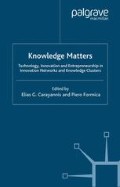Abstract
The more money governments put into elite universities, the better those institutions will perform, with the associated benefits for the national R&D system, and the more likely it is that their academics’ work will be published in highly reputed journals. This is a cherished tenet of most European public educational and research policies, which are currently under attack.
Access this chapter
Tax calculation will be finalised at checkout
Purchases are for personal use only
Preview
Unable to display preview. Download preview PDF.
References
Amidon, Debra M., Formica, Piero, and Mercier-Laurent, Eunika, eds (2006), Knowledge Economics: Emerging Principles, Practices and Policies, Vol. 1, Tartu University Press, Tartu.
Bell, T. (2006), ‘Prediction markets for promoting the progress of science and the useful arts’, George Mason Law Review, Vol. 14, http://ssrn.com/abstract= 925989.
Boettke, Peter J., and Coyne, Christopher J. (2005), ‘Concerting entrepreneurship: an international public good’, in Boyd, Gavin, Rugman, Alan M., and Padoan, Pier Carlo, eds, European–American Trade and Financial Alliances, Edward Elgar, Oxford, pp. 199–226.
Carayannis, Elias G. (1993), ‘Increméntalisme stratégique’, Le Progrès technique, No. 2.
Carayannis, Elias G. (1994), ‘Gestion stratégique de l’apprentissage technologique’, Le Progrès technique, No. 2.
Carayannis, Elias G. (2000), ‘Investigation and validation of technological learning versus market performance’, Technovation, Vol. 20, pp. 389–400.
Carayannis, Elias G. (2000a), The Strategic Management of Technological Learning: Learning to Learn-How-to-Learn in High Tech Firms and its Impact on the Strategic Management of Knowledge, Innovation and Creativity Within and Across Firms, IEEE/CRC Press, Boca Raton, FL.
Carayannis, Elias G., GWU School of Business Lectures on Science and Technology, 1996–2005.
Carayannis, Elias G., GWU School of Business Lectures on Entrepreneurship and Innovation, 2000–05.
Carayannis, Elias G. (2004), ‘Measuring intangibles: Managing intangibles for tangible outcomes in research and innovation’, International Journal of Nuclear Knowledge Management, Vol. 1, pp. 49–67.
Carayannis, Elias G., ECE Programme on Entrepreneurship Lectures, 2005.
Carayannis, Elias, and Alexander, Jeffrey (2006), Global and Local Knowledge: Glocal Transatlantic Public–Private Partnerships for Research and Technological Development, Palgrave Macmillan, Basingstoke.
Carayannis, Elias G., and Allbritton, Marcel (1997), ‘A case study of computermediated communication among 100 scholars in 15 countries’, Online Journal of Internet Banking and Commerce, http://www.arraydev.com/ commerce/JIBC/9806=07.htm
Carayannis, Elias G., and Alexander, Jeffrey (1999), ‘Winning by co-opeting in strategic government–university–industry (GUI) partnerships: The power of complex, dynamic knowledge networks’, Journal of Technology Transfer, Vol. 24, pp. 197–210.
Carayannis, Elias G., and Campbell, David F. J., eds, (2006), Knowledge Creation, Diffusion and Use in Innovation Networks and Knowledge Clusters: A Comparative Systems Approach Across the United States, Europe and Asia, Praeger, Westport, CT.
Carayannis, Elias G., and Gonzalez, Edgar (2003), ‘Creativity and innovation = competitiveness? When, how, and why?’, in Shavinina, Larisa V., ed., The International Handbook on Innovation, Pergamon, Amsterdam, pp. 587–606.
Carayannis, Elias, and Juneau, Todd (2003), Idea Makers and Idea Brokers in High- Technology Entrepreneurship: Fee vs Equity Compensation for Intellectual Venture Capitalists, Praeger Books/Greenwood Press, Westport, CT.
Carayannis, Elias, and Sipp, Caroline (2005), e-Development Towards the Knowledge Economy, Palgrave Macmillan, Basingstoke.
Carayannis, Elias G., and von Zedtwitz, Maximilian (2005), ‘Architecting GloCal (Global–Local), real-virtual incubator networks (G-RVINs) as catalysts and accelerators of entrepreneurship in transitioning and developing economies’, Technovation, Vol. 25, pp. 95–110.
Carayannis, Elias G., and Ziemnowicz, Chris, eds (2007), Re-discovering Schumpeter, Palgrave Macmillan, Basingstoke.
Carayannis, Elias G., Popescu, Denisa, Sipp, Caroline and Stewart, McDonald (2006), ‘Technological learning forentrepreneurial development (TL4ED) in the knowledge economy (KE): Case studies and lessons learned’, Technovation, Vol. 26, pp. 419–43.
Dixit, A. (2006), ‘Evaluating recipes for development success’, World Bank Policy Research Working Paper 3859, World Bank, Washington, DC.
Formica, Piero (2003), Industry and Knowledge Clusters: Principles, Practices, Policy, Tartu University Press, Tartu.
Formica, P. (2004), Strengthening the Knowledge Economy, EffeElle Editori, Ferrara.
Formica, Piero (2005), ‘Knowledge entrepreneurs: leveraging knowledge clusters for economic development based on innovative advantages’, IC Mag [Intellectual Capital Magazine], No. 1.
Formica, Piero (2006), ‘Knowledge-relevant economic policy: Analyzing knowledge policymaking in managed and free-market economies’, in Amidon, Debra, Formica, Piero, and Mercier-Laurent, Eunika, eds, Knowledge Policy: Principles, Practices and Policies, Tartu University Press, Tartu.
Goethe, Johann Wolfgang von (1809), Die Wahlverwandtschaften, as Elective Affinities, trans R. J. Hollingdale, Penguin, London, 2005.
Kim, E. Han, Morse, Adair, and Zingales, Luigi (2006), ‘Are elite universities losing their competitive edge?’, Working Paper 12245, http://www.nber.org/papers/w12245, National Bureau of Economic Research, Cambridge, MA.
Prior, V. (2005), The Language of Business Intelligence, Society of Competitive Intelligence Professionals, Alexandria, VA, http://www.scip.org/ci/languagebi.asp
Rubin, H. (1998), ‘The new merchants of light’, Leader to Leader, No. 10, pp. 34–40.
Thompson, J. (1999), ‘The world of the entrepreneur – a new perspective’, Journal of Workplace Learning: Employee Counselling Today, Vol. 11, No. 6, pp. 209–24.
Editor information
Editors and Affiliations
Copyright information
© 2008 Elias G. Carayannis and Piero Formica
About this chapter
Cite this chapter
Carayannis, E.G., Formica, P. (2008). Introduction. In: Carayannis, E.G., Formica, P. (eds) Knowledge Matters. Palgrave Macmillan, London. https://doi.org/10.1057/9780230582262_1
Download citation
DOI: https://doi.org/10.1057/9780230582262_1
Publisher Name: Palgrave Macmillan, London
Print ISBN: 978-1-349-54725-8
Online ISBN: 978-0-230-58226-2
eBook Packages: Palgrave Business & Management CollectionBusiness and Management (R0)

